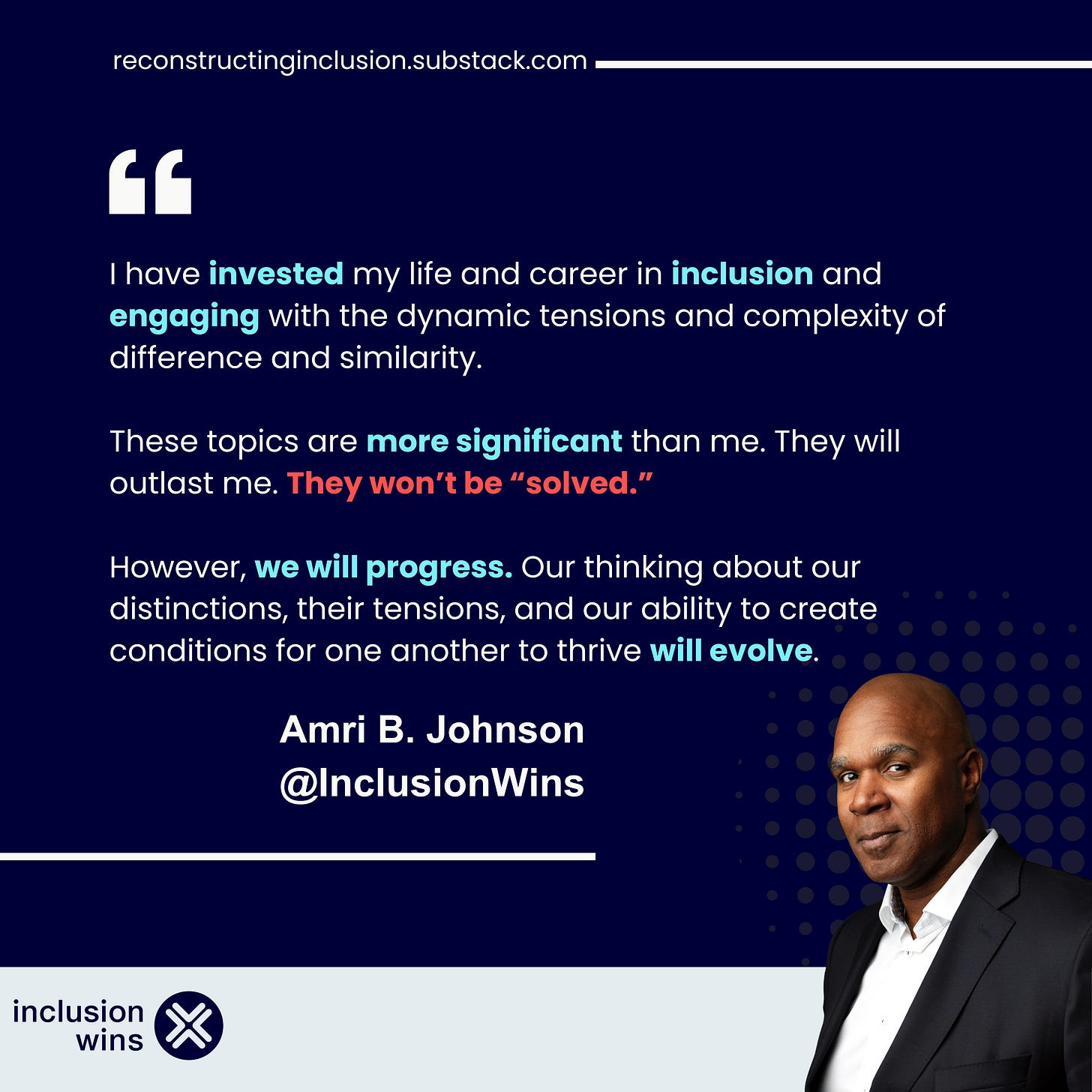Defunding the Police. . .
The DEI police, that is. . .
The current DEI discourse is rife with policing. What do I mean by this?
First. What are the DEI Police?
I recently came across a person on X who creates TikTok videos under a business called Occupational Cares Diversity Affairs (OCDA). People send him anonymous complaints about their employers, and he goes to the workplace and confronts the people working there in the words of the complainant–colleagues, managers, owners, and occasionally customers. It's hilarious–for entertainment purposes only (he’s a professional comedian), of course.
Some individuals who fashion themselves, social justice advocates, antiracism practitioners, or both in organizations have taken seriously what for “Mr. Radliff” is a satirical/comic/entertainment role.
They have come to believe that doing racism/racist surveillance is their job—that is, to find racism, sexism, phobias, gaslighting (often not in the classical sense, but in the fragile one), and all the other issues they are surveying for. Once found, many do everything they can to shame those they perceive as responsible for these issues.
The tactics of people inside organizations are less straightforward than Mr. Radliff's approach. Shaming and calling out don’t come to the accused individual directly. Instead, the acts understood to be racist are shared in public forums online in addition to spreading the word amongst those they regularly confide in internally. Or, they probe to see if others have had similar experiences before their "antiracist intervention.
What’s the impact of this approach? If you watch the OCDA videos, the whole frontal confrontation of Mr. Radliff and his team is a bit like “Homey the Clown” from the television comedy classic In Living Color.
The result is that when it comes to DEI, people often refrain from expressing their perspectives because they fear the DEI police will target them.
Here's another take on the DEI police.
People who work in DEI and believe in its principles have become increasingly vigilant, especially over the past four years since the death of George Floyd. They have been persistent in identifying instances of racism in their organizations with the belief that they can eradicate it, which is not true.
In fact, when you attempt to eradicate or solve a problem as persistent and human as tribalism, which sometimes translates into xenophobia or racism, you end up creating more conflict rather than finding a solution. This trade-off simply isn't worth it. No research supports this approach, nor are there real examples demonstrating its sustainability.
And, the above is only one form of the DEI police.
Are you optimistic about the future of DEI efforts?
We now have individuals who are actively opposing DEI. We can imagine and have likely already experienced, at least on social media, that the attacks on DEI will be amplified. Interestingly, the attacking of DEI is an amorphous dynamic that isn't necessarily “real” because most of the so-called attackers have little to no idea what DEI is or can be beyond what they hear and read from others who know little about DEI beyond the actions of their social justice/antiracist passionate DEI police counterparts.
For most, deriding DEI consists of no more than a shallow reaction to some of their favorite influencers discussing DEI in terms of identity politics and what Yascha Mounk referred to as identity synthesis.
The DEI police, in the antiracist/social-justice sense, have targeted individuals based on their appearance, and now people (including some who have group identities considered part of the “marginalized” communities they feel that they are passionately protecting) are pushing back, which was inevitable.
I discussed this in Reconstructing Inclusion. I knew it would happen, and it has. I don't like to say I told you so, but I do enjoy being right, even if it's not right to like it as much as I do.
Now, the second type of DEI police has emerged and has become more emboldened over the past year or two, coinciding with the attacks on DEI programs and organizations. There will likely be more of these attacks ramping up in the government. I say, let them come.
The new DEI police, let’s call them the “DEI must DIE” sort, may replace the “old” DEI police. What’s unlikely but that I am still hopeful for is that both DEI police types, at least a few of them, can come together to discuss what DEI truly means. That is, openly and honestly talk about their perspectives, perceptions, and how DEI has been practiced, the good, bad, and ugly. They will both be conflicted as their perceptions might mirror each other. The mirror, I believe, will reveal the incomplete notions of their respective polar freezes.
So where do we want to go?
We need to take a different approach to DEI. Let's defund those who spend the majority of their energy on grievances and wrongdoings.
Equally, let's energetically defund those who attack something inherently for everyone, something that, if appropriately designed, is accessible and helpful to all. It should be actionable–that is, unambiguously prioritized. When an organization intentionally and proactively puts something into action, their why becomes clearer.
So, unambiguous prioritization is not arbitrary. All employees can rely on it to create conditions for everyone to thrive and for the organization to be generative. The DEI efforts should align with the organizational purpose. Therefore, we need to defund all the DEI police—those attacking the notion of DEI in a grossly incomplete manner and those perpetuating that same notion in a way that is not meaningful, accessible, actionable, or aligned with what the organization strives to create each day in its interdependence.
Let me reinforce my position for those who are only interpreting this piece as my dismissiveness of, lack of understanding of, or lack of acknowledgment of “genuine experiences of marginalization,” as one colleague respectfully questioned in response to one of my posts on LinkedIn.
When I say "defund," I refer to tired approaches to DEI that simply do not work and people's reactions to their ineffectiveness or incompleteness.
We should not stop investing in creating conditions for people to thrive and for organizations to generate value beyond profit and loss. This is how I view inclusion, reflecting my DEI practice.
When I refer to defunding the DEI police, I mean to take away social influence and extreme positions that do not contribute positively to what organizations or society benefit from most. That means we should allocate our resources, time, energy, and attention to those who genuinely want to create conditions for everyone to thrive. Some of us will call it DEI. Others might be allergic to the term in their “DEI must DIE” policing stance. The bottom line is that our prioritized actions as part of any organization or institution must be beneficial for personal growth and for individuals to contribute best to the organizational mission.
If we achieve this, we can move DEI beyond the mundane. We can transcend the approaches with limited effectiveness promoted by antiracist/social justice DEI police and adversely reacted to by their mirrored DEI (must die) police counterpoles who speak of things such as accusations of reverse racism or discrimination against specific groups. (By the way, “reverse discrimination” doesn’t need the “reverse” adjective.)
Discrimination is discrimination.
While these criticisms have some truth, they are not absolutes. Group identity is not the sole root of all problems for historically less represented groups in some professions. Nor does DEI connote that people from certain groups, when selected for a role, are inevitably unqualified DEI hires.
The criticism and the passion for reducing inequity are valid yet incomplete perspectives and do not lead us to our desired outcomes. Consequently, we struggle to engage effectively and miss opportunities to foster the contact and collective action necessary to incessantly discover and co-create what people need to do to make their best contributions.
Framing DEI as culture development, fostering relatedness, interdependence, and thriving, among other things, is a way forward that moves us away from unproductive attention and resources spent opposing grievance-based approaches. If there is a deliberate movement away from the grievance-based paradigm to a focus on everyone thriving and the organization creating extraordinary value for people and profit, the overindexing on the grievance-based paradigm will naturally begin to diminish.
I hope this was helpful. . . Make it a great day! ✌🏿







